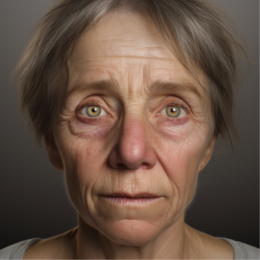Understanding the Stages of Dementia: What to Expect?

As the global population ages, the world is witnessing a surge in cases of dementia, affecting millions of people worldwide. The condition is characterized by a progressive deterioration of cognitive function, affecting memory, thinking, behavior, and the ability to perform daily tasks. Understanding the dementia stages and its symptoms can be instrumental in managing the disease and providing appropriate care.
Facts and Statistics: According to Alzheimer’s Disease International (ADI), around 60% of people with dementia worldwide live in low- and middle-income countries, a figure expected to rise to 71% by 2050.
Explanation of Dementia
Dementia is a collective term used to describe a group of symptoms that impair social and intellectual abilities severely enough to interfere with daily functioning. Alzheimer’s disease is the most common type of dementia, accounting for up to 80% of cases (Alzheimer’s Association, 2021).
Facts and Statistics: Alzheimer’s disease is named after Dr. Alois Alzheimer, who first described the disease in 1906.
Common Types of Dementia
Besides Alzheimer’s, other forms of dementia include vascular dementia, Lewy body dementia, and frontotemporal dementia. Each type has its own set of symptoms and progression rate, but they all share the common characteristic of causing cognitive impairment.
Facts and Statistics: Vascular dementia, the second most common type of dementia, is often caused by stroke or other conditions that block blood flow to the brain.
Why Is Dementia Progressive?
The progression of dementia is primarily due to continuous and irreversible damage to brain cells. This damage expands over time, impacting more parts of the brain and increasing symptom severity and functional impairment.
Facts and Statistics: Dementia affects each person differently, depending on the impact of the disease and the person’s personality before becoming ill.
Factors Affecting Speed of Progression
Various factors influence the speed of dementia progression, including the type of dementia, overall health, age, and genetic makeup. Recent research suggests that stress can accelerate dementia progression, emphasizing the importance of stress management in dementia care (Alzheimer’s Research UK, 2020).
Facts and Statistics: According to the Alzheimer’s Association, people with a history of heart disease, stroke, high blood pressure, or high cholesterol have a higher risk of developing Alzheimer’s dementia and others.

3 Stages of Dementia
Early Stage
The initial stage of dementia, often referred to as mild dementia, can be easy to overlook as the symptoms are usually subtle. Common symptoms include minor memory problems, such as forgetting familiar names or losing personal belongings. Individuals at this stage might also face difficulty in planning and organizing or even find it harder to find the right words during conversations. It’s also not uncommon to see slight mood changes or apathy.
Facts and Statistics: While memory loss is a common early symptom of Alzheimer’s, not all memory loss indicates Alzheimer’s disease.
Middle Stage
As dementia progresses into the middle stage, the signs become more apparent and significantly interfere with daily life. Signs of moderate dementia include increased memory loss and confusion, difficulties recognizing friends and family, and an inability to learn new things. Behavioral changes such as withdrawal from social activities, increased agitation, and changes in sleep patterns are often observed. It’s also at this stage that individuals may require assistance with some daily activities.
Facts and Statistics: Patients in the middle stage of Alzheimer’s disease might experience “sundowning,” a state of increased confusion and agitation in the late afternoon and evening.
Later Stage
The last stages of dementia are often the most challenging for individuals and their caregivers. That’s why it’s vital to understand what happens in the last stages of dementia to those suffering from it. The disease impacts all areas of the brain, causing significant memory loss, difficulty communicating, physical disabilities, and drastic changes in personality. People in this stage may lose the ability to walk or even swallow and will require full-time care. It’s crucial to maintain a high level of compassion and patience during this stage, providing comfort and minimizing distress.
Facts and Statistics: Patients in the late stage of dementia often have a reduced sense of pain and might not realize when they are injured or ill.
Impact on Daily Living
Dementia can drastically impact the daily living of individuals. They may struggle with routine activities such as dressing, eating, and bathing, particularly in the later stages. This shift affects the individuals and their caregivers, requiring them to provide continual assistance and emotional support.
Facts and Statistics: Dementia costs the world $1 trillion annually, a figure set to double by 2030 (World Alzheimer Report, 2018).
Life Expectancy for People with Dementia
Life expectancy varies considerably for people with dementia. The average lifespan after diagnosis is often between 4 and 8 years. However, some people live as long as 20 years after diagnosis, particularly if they are diagnosed early in the disease and have otherwise good health.
Facts and Statistics: Despite the daunting statistics, studies have shown that lifestyle changes, including a healthy diet, regular physical and social activity, and lifelong learning, may help delay the onset of dementia symptoms.
The Role of Caregivers
The role of caregivers is indispensable in managing dementia. Providing physical care, emotional support and maintaining the patient’s safety and quality of life are fundamental aspects of caregiving. It is equally important for caregivers to care for their own mental and physical well-being.
Facts and Statistics: In 2020, more than 11 million Americans provided unpaid care for people with Alzheimer’s or other dementias, equating to an estimated 15.3 billion hours of unpaid care (Alzheimer’s Association, 2021).
Medical Treatments and Interventions
While there’s currently no cure for dementia, there are treatments available to manage symptoms. These include medication to improve cognitive symptoms, as well as therapies to manage behavioral symptoms. Research is ongoing to develop new and more effective treatments.
Facts and Statistics: According to Alzheimer’s Disease International, less than 50% of people with dementia worldwide receive a diagnosis, leading to a delay in accessing available treatments.
Conclusion
Understanding the progression and stages of dementia is crucial for improving the management of the disease and providing appropriate care. While dementia presents significant challenges, understanding its stages, knowing what to expect, and providing a supportive environment can make a big difference in managing the disease. As research advances, there is hope for more effective treatments and interventions in the future.
References:
- World Health Organization (2021). Dementia. Retrieved from https://www.who.int/news-room/fact-sheets/detail/dementia
- Alzheimer’s Association (2021). Alzheimer’s Disease Facts and Figures. Retrieved from https://www.alz.org/alzheimers-dementia/facts-figures
- Alzheimer’s Research UK (2020). Stress and Dementia. Retrieved from https://www.alzheimersresearchuk.org/about-dementia/risk-factors-and-prevention/stress/
- Alzheimer’s Disease International (ADI). Global estimates of informal care. Retrieved from https://www.alz.co.uk/adi/pdf/global-estimates-of-informal-care.pdf
- Alzheimer’s Disease International (ADI). Dementia Statistics. Retrieved from https://www.alz.co.uk/research/statistics
- World Alzheimer Report 2018. The state of the art of dementia research: New frontiers. Retrieved from https://www.alz.co.uk/research/WorldAlzheimerReport2018.pdf
- Alzheimer’s Association (2021). Stages of Alzheimer’s. Retrieved from https://www.alz.org/alzheimers-dementia/stages
- National Institute on Aging (2021). What Happens to the Brain in Alzheimer’s Disease? Retrieved from https://www.nia.nih.gov/health/what-happens-brain-alzheimers-disease





